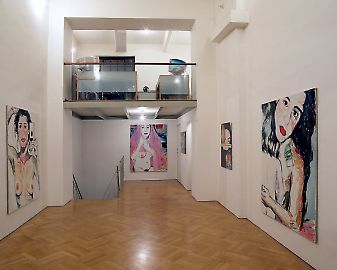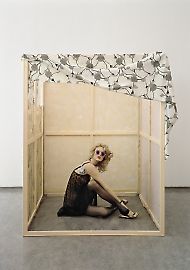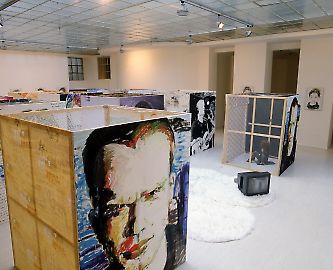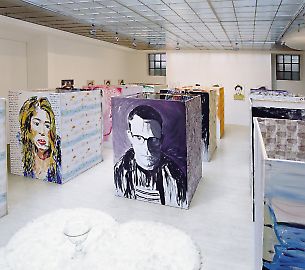Elke Krystufek --
This project by Elke Krystufek, previously shown in Frankfurt’s Portikus (July 7 to August 20, 2000), Nowbody has to know, refers to a title song by the Californian band Spain: the faces of the band members can be found on each side of the eleven accessible fabric dwellings. A curtain hanging on each opposite site invites us to enter the intimate spaces of the tents, where, alone with a mannequin, meaningful private stories from the life of the artist can be listened to on a Walkman. In English, with a soft voice and slight accent, read by Elke Krystufek herself.(1)
[…] As she searches for the rupture of the limits of the word, Elke Krystufek always leads us back to Wittgenstein: […] “What we cannot talk about we must pass over in silence,” from the prologue of the Tractatus Logico-Philosophicus. Here is the key for the relationship of Krystufek’s work to Wittgenstein’s philosophy of language: the use of language games to attack the unutterable. The artist states that, “by listening to popular music, English became my language to express the unsayable, embarrassing things.”(2) […] The answer to the interdiction is in transgression, the social rule of the unmentionable in scandal, the unutterable in the diction of what could still be said through other means of communication and expression. However, Krystufek has a feeling about her personal history with language and its logocentric character: “It seems also to tell a story of the loss of innocence everyday, at the same time as I am gaining knowledge I am also losing something all the time.”(3)
Krystufek’s oeuvre is a struggle for the inscription of desire in language. It will suffer from the excess of desire and the lack of it. Out of extreme exacerbation […] Krystufek dismantles the “body without organs”and explores its functioning. Through paintings, drawings, photographs, videos, and performances, Krystufek produces an epidemics of partial objects. By producing a certain corporeal excitability (gaze, touch, mobilization, and so on), Krystufek seems to articulate and reinforce a conscious desire, both fluctuating and masked. Yet there is a longing for the unconscious desire. Krystufek counters the existence of secret zones in her work by introducing explicitness as her form of transparency. […]
(1) Editor’s note
(2) Krystufek to the author, 23 January 2000: “in my personal diary I started to use it already in 1987, while I did the first major art piece in English seven years later.”
(3) Krystufek to the author, 20 Feburuary 2000.
Paulo Herkenhoff, “Elke Krystufek––Foreigner in her own Bed,” in: exhibition catalogue Elke Krystufek. Nobody has to know, Porticus, Frankfurt/M. 2000, pp. 29-39.





